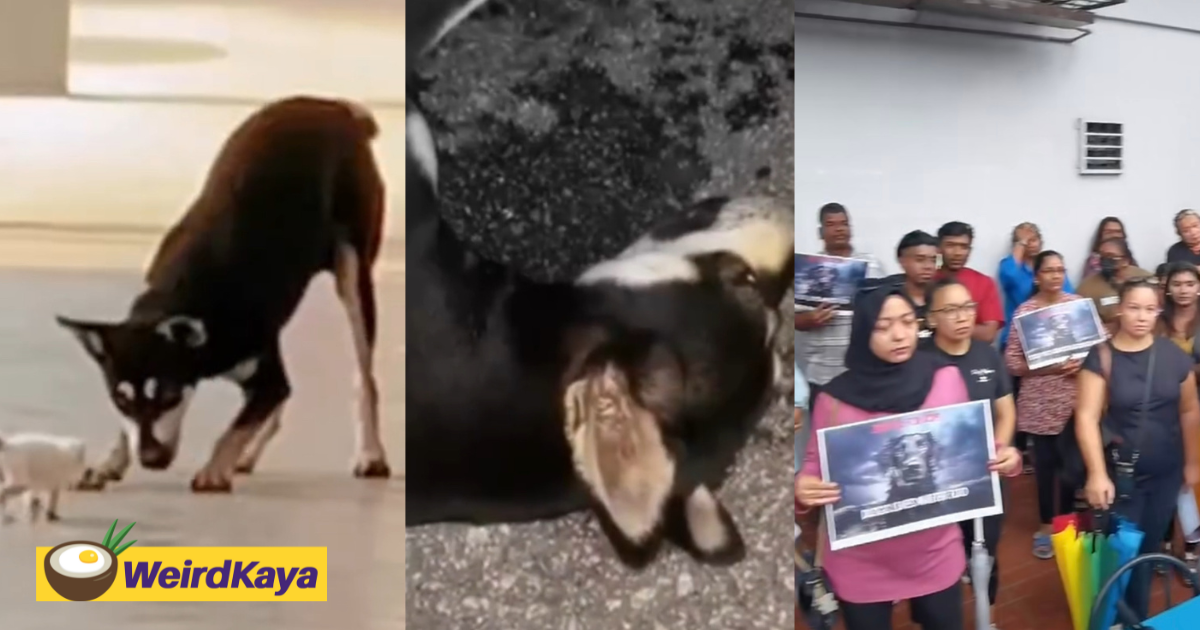On Oct 6, just two days after World Animal Day, a tragedy unfolded in Terengganu.
Kopi, a beloved stray dog known for her gentle nature, was shot by local council authorities. What followed was an outpouring of grief, anger, and action from animal lovers across the country.

In case you’re out of the loop over what has happened, here’s a detailed chronology of events and the ongoing movement seeking justice for Kopi.
Oct 6: Kopi’s tragic death
On Sunday, October 6, Terengganu residents were shocked by the sound of gunshots.
A witness, who knew Kopi well, rushed out to find her lying on her side, bleeding and crying in pain after being shot by Majlis Bandaraya Kuala Terengganu (MBKT) staff.
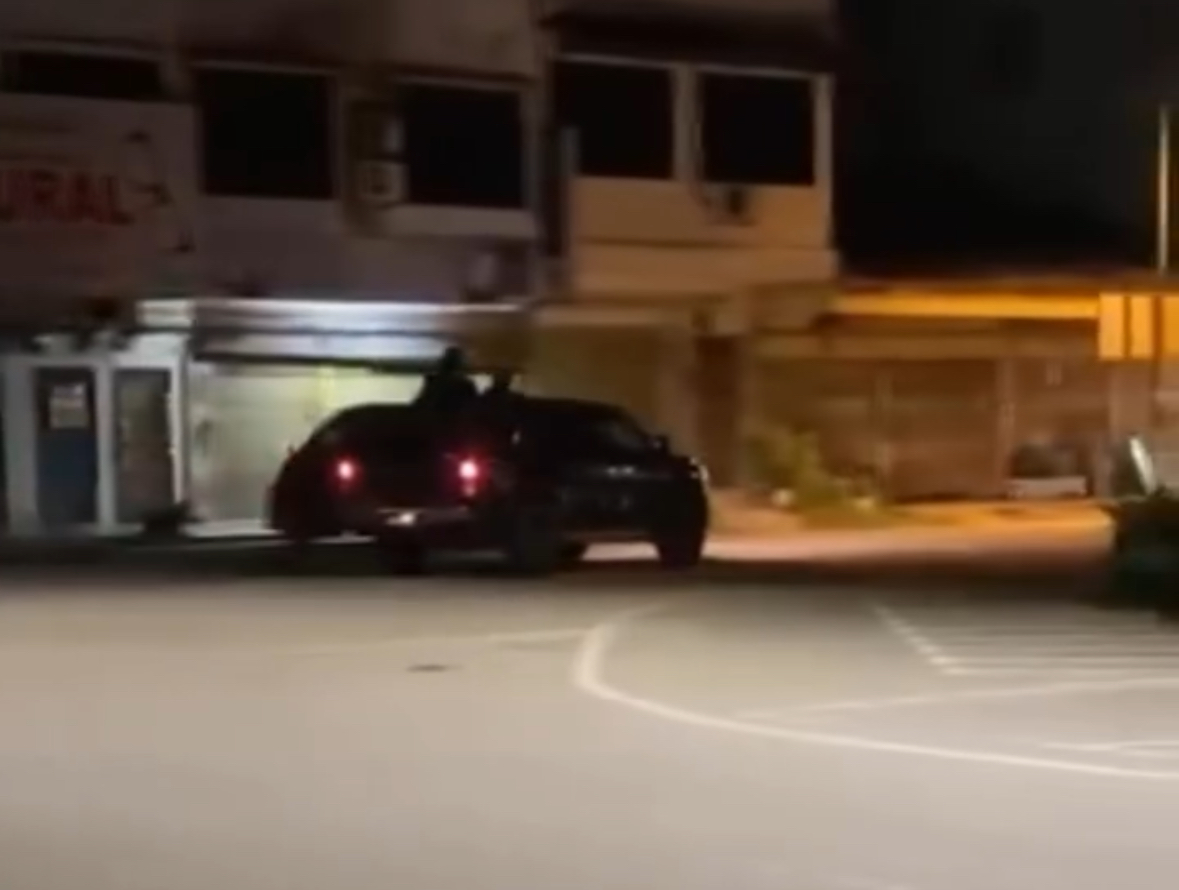
Despite attempts to comfort her, Kopi passed away from her injuries shortly after.
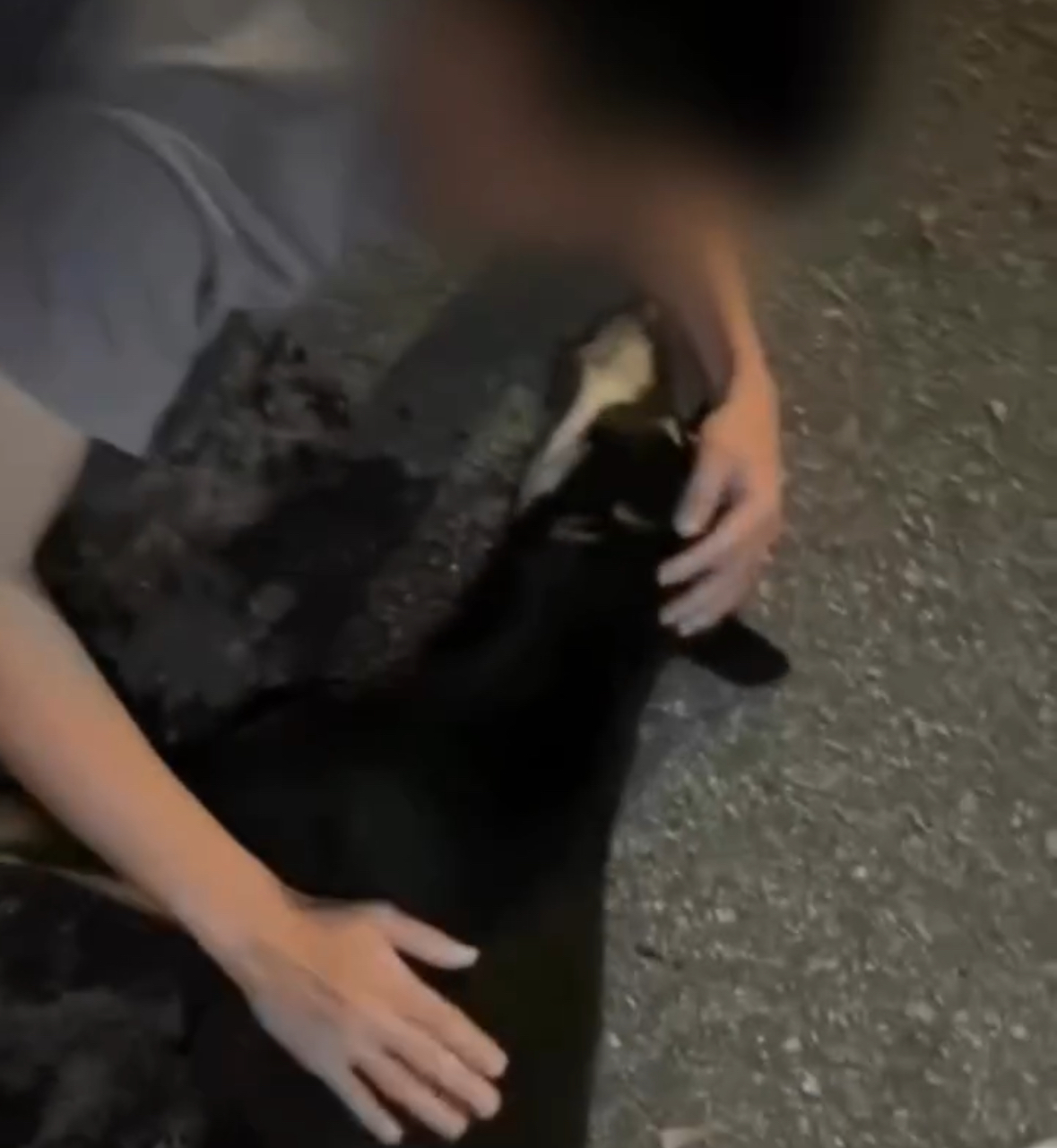
Kopi, known to be a “big sister” to local stray cats and puppies, was loved by the community for her harmless and gentle nature. Her death devastated residents, sparking immediate outrage.
October 7-13: Outrage & rise of #JusticeForKopi
News of Kopi’s death quickly spread, igniting anger and heartbreak across social media. The hashtag #JusticeForKopi began circulating like wildfire, with Malaysians expressing their sadness and demanding accountability from MBKT.
Animal rights organisation Persatuan Haiwan Terbiar Malaysia (SAFM) was the first to mobilise the public, where it urged Malaysians to report the incident to the Department of Veterinary Services (DVS).
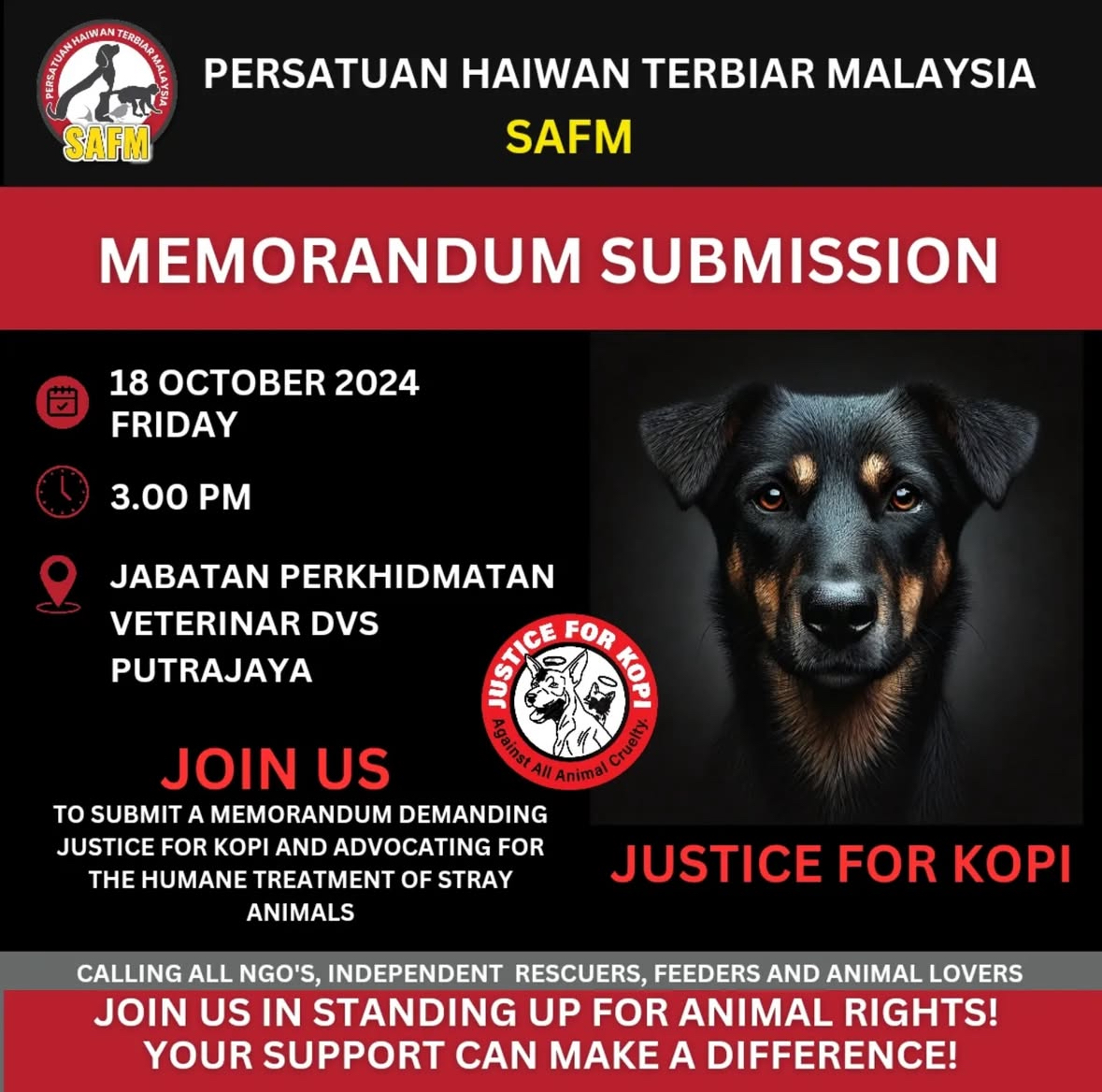
They also provided guidance on how to file a report and lodge a complaint to DVS’ hotline.
Amid the rising wave of public outcry, SAFM and other NGOs vowed to seek justice for Kopi and announced plans to meet with legal teams to explore actions that could prevent such incidents from happening again.
They also called for more humane methods such as Trap-Neuter-Return (TNR) methods to be deployed in addressing stray animal populations instead of killing them inhumanely.
October 12: SAFM condemns the shooting, MDB defends its actions
On October 12, 2024, SAFM publicly condemned the shooting of Kopi, denouncing the act as a violation of animal rights and criticising the council’s failure to manage stray animals ethically. In response to this criticism, the Besut District Council (MDB) released a statement defending its actions.
MDB Chairman Sukeri Ibrahim explained that the operation aligned with standard operating procedures (SOP) established by the Housing and Local Government Ministry.
Sukeri revealed that 25 personnel from MDB, the Besut District Veterinary Office, and the Kota Putera State Legislative Assembly office had been involved in the operation to capture and destroy stray dogs in Jerteh, reported NST.
He justified the council’s actions by citing:
- 62 complaints about stray dogs received between January and September 2024.
- Reports of aggressive dogs near the Jerteh BSN branch attacking passersby.
- The Dog Licensing By-Laws (Besut District Council) 1990, which allows the destruction of dogs with no identifiable owner.
- Section 30 of the Animal Welfare Act 2015, which permits the use of firearms under specific circumstances.
Sukeri denied allegations that the dog’s body was abandoned, stating that council officers had been obstructed by the complainant, preventing them from retrieving and burying Kopi’s remains as per SOP.
He added that while the state government expressed concern over the incident, the council’s actions complied with regulations prioritising public safety. Sukeri concluded by calling for discussions between local authorities and NGOs to address the rising number of stray dog complaints.
Oct 14: Legal Actions and Growing Support for #JusticeForKopi
By Monday, the #JusticeForKopi movement had gained significant momentum, with animal rights lawyer Rajesh Nagarajan confirming that a civil suit would be filed against the Besut District Council in Terengganu for violating the Animal Welfare Act 2015.

NGOs, legal teams, and independent rescuers were also united in their call for the officers involved in Kopi’s shooting to face legal consequences.
SAFM pointed out that under Malaysian law, any person who regularly feeds and cares for a stray animal is legally considered its owner, reported The Vibes.
This revelation added another layer to the case, as it was revealed that Kopi had been regularly fed by a local caretaker, further highlighting the illegality of MBKT’s actions.
Petitions seeking justice for Kopi garnered nearly 20,000 signatures, and over 65 formal complaints were filed with the DVS, intensifying the demand for change.
Oct 15: Rally at Sentul Police Station
Yesterday, approximately 100 people gathered outside at the Sentul police station in Kuala Lumpur to show their support for the #JusticeForKopi movement.
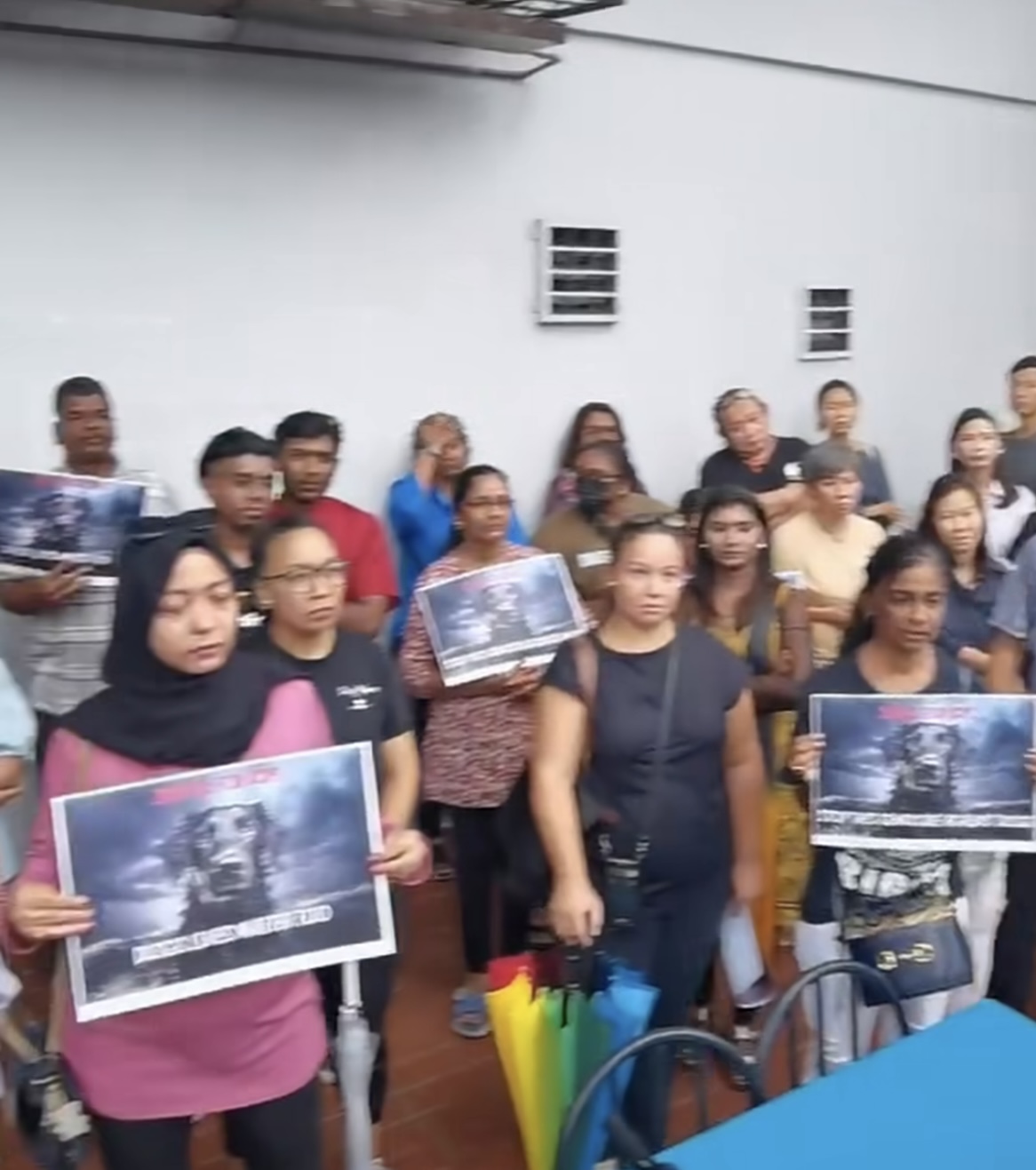
Rajesh Nagarajan, along with other animal rights advocates, filed a police report against the local authorities involved in Kopi’s death.
Global Human Rights Federation’s Sashi Kumar Shanmugam also filed a report, emphasising that using firearms against animals is restricted and should only be permitted when human lives are at risk.
He reiterated that Kopi was not a stray as she had a regular feeder, legally making her an “owned” animal under the Animal Welfare Act 2015.
Oct 18: Submission of memorandum
The next critical step in the movement will take place on Friday, where SAFM, along with other animal rights organisations such as SPCA, MAWA, and Lawyers of Animal Rights, will submit a memorandum to the Department of Veterinary Services (DVS) in Putrajaya at 3pm.
The memorandum calls for justice to be served in light of Kopi’s death and advocate for the ethical treatment of all stray animals in Malaysia.
It is also aimed at ensuring that such incidents do not recur and that more humane methods for handling stray populations are adopted.
Moving forward: Continuing the fight for animal rights
While Kopi’s tragic passing has left a deep wound, it has sparked a powerful movement pushing for change as a result.
The ongoing efforts, from legal action to petitions and public gatherings, reflect the growing consensus that Malaysia needs better systems in place to handle stray animals. Humane methods such as TNR and adoption must be prioritised over culling, and transparency in animal welfare practices must be enforced.
For those wishing to contribute or show support, the SAFM hotline (013-7066770) remains open for further reports and assistance in seeking justice for Kopi.
Rest in peace, Kopi. We hope you will get justice.



